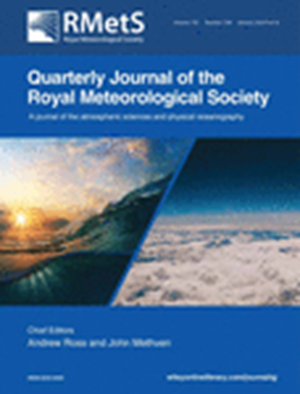Sequential Markov chain Monte Carlo for Lagrangian data assimilation with applications to unknown data locations
IF 2.9
3区 地球科学
Q2 METEOROLOGY & ATMOSPHERIC SCIENCES
引用次数: 0
Abstract
We consider a class of high‐dimensional spatial filtering problems, where the spatial locations of observations are unknown and driven by the partially observed hidden signal. This problem is exceptionally challenging, as not only is it high‐dimensional, but the model for the signal yields longer‐range time dependences through the observation locations. Motivated by this model, we revisit a lesser‐known and应用于未知数据位置的拉格朗日数据同化的序列马尔可夫链蒙特卡洛方法
我们考虑了一类高维空间滤波问题,在这类问题中,观测的空间位置是未知的,并由部分观测到的隐藏信号驱动。这个问题极具挑战性,因为它不仅是高维的,而且信号模型通过观测位置产生了较长距离的时间相关性。受这一模型的启发,我们重温了 Berzuini 等人(1997,《美国统计协会学报》,92,1403-1412);Centanniand Minozzo(2006,《美国统计协会学报》,101,1582-1597);Martin 等人(2013,《统计数学研究所年刊》,65,413-437)的一种鲜为人知且可证明收敛的计算方法,该方法使用顺序马尔可夫链蒙特卡罗(MCMC)链。我们将这一方法扩展用于观测位置未知的数据过滤问题。我们在线性高斯状态空间模型上对我们的算法与竞争对手的集合方法进行了基准测试,结果表明我们的算法在执行速度和准确性上都有显著提高。最后,我们利用真实数据和合成数据对高维旋转浅水模型(约-维)进行了实际案例研究。这些数据由美国国家海洋和大气管理局(NOAA)提供,包含了海洋漂流器在大西洋海域的观测数据,分别限于经度和纬度区间的 、 、 。
本文章由计算机程序翻译,如有差异,请以英文原文为准。
求助全文
约1分钟内获得全文
求助全文
来源期刊
CiteScore
16.80
自引率
4.50%
发文量
163
审稿时长
3-8 weeks
期刊介绍:
The Quarterly Journal of the Royal Meteorological Society is a journal published by the Royal Meteorological Society. It aims to communicate and document new research in the atmospheric sciences and related fields. The journal is considered one of the leading publications in meteorology worldwide. It accepts articles, comprehensive review articles, and comments on published papers. It is published eight times a year, with additional special issues.
The Quarterly Journal has a wide readership of scientists in the atmospheric and related fields. It is indexed and abstracted in various databases, including Advanced Polymers Abstracts, Agricultural Engineering Abstracts, CAB Abstracts, CABDirect, COMPENDEX, CSA Civil Engineering Abstracts, Earthquake Engineering Abstracts, Engineered Materials Abstracts, Science Citation Index, SCOPUS, Web of Science, and more.

 求助内容:
求助内容: 应助结果提醒方式:
应助结果提醒方式:


